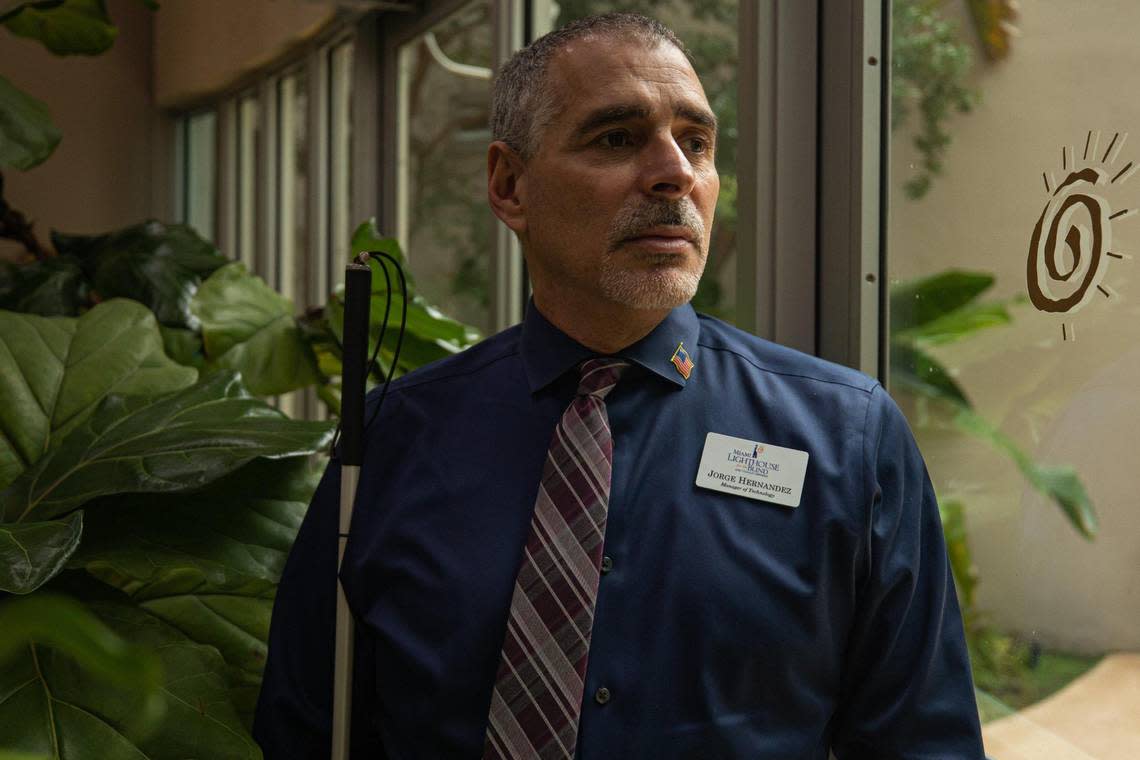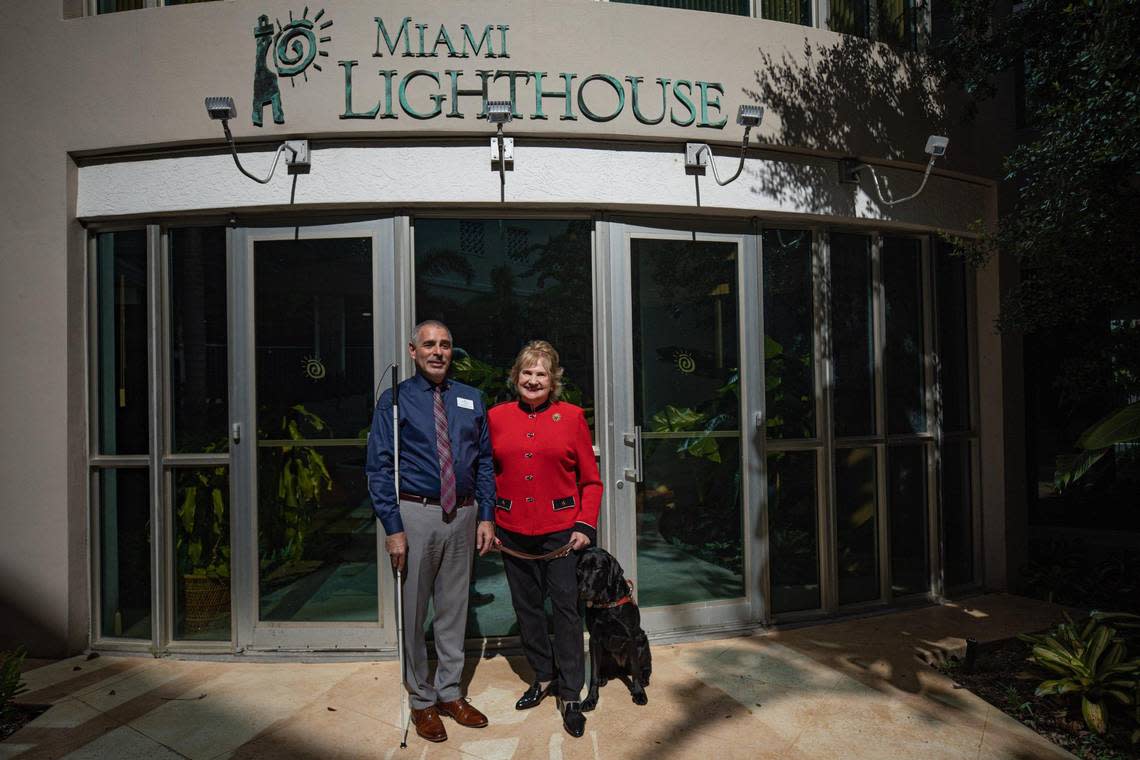70 percent of blind adults are unemployed. Miami Lighthouse is helping to change that
The Miami Lighthouse for the Blind and Visually Impaired may be best known for its impactful work bringing free eye exams to local schools and hosting early childhood education for vision impaired youth. A year ago, Miami Lighthouse opened Florida’s first CVI center to respond to the leading cause of pediatric visual impairment.
All this work continues, of course, but this 91-year-old award-winning Miami nonprofit organization has also long supported adults as well, and recently has been doubling down on its digital literacy programming as well as its website accessibility advocacy.
It’s all about helping the blind and visually impaired effectively engage in our digital world.
Miami Lighthouse has recently opened a learning lab to help the blind and visually impaired learn to use the computer and smartphone, whether for employment opportunities or to ease their everyday life. The learning lab adds to the nonprofit’s work it has done with its call center training center for several years.

Jorge Hernandez is the technology manager at Miami Lighthouse, overseeing the nonprofit’s training processes and learning curricula, all individualized for the client. The vigorous training, such as for learning skills for call center jobs, could last anywhere from six to 12 months, he says. Miami Lighthouse has trained hundreds of people for employment at insurance companies, healthcare companies, hotels, nonprofits and others.
“We provide not just the training, but we also provide that support once they are working,” says Hernandez, who is also blind. “We’re trying to get more and more people back into the workforce, because there’s not too many of us out there who are employed.” Indeed, unemployment among the blind reaches 70%.
For other blind or visually impaired clients, particularly seniors, Miami Lighthouse provides help as their constituents need it in the learning lab. Anyone using the campus can stop by to ask a question or get some tech help.
“That’s extremely important because everything’s digital nowadays,” says Hernandez. “If you’re not connected on the web, you’re literally not connected.”
Hernandez says it’s about opening their world. It’s critical for everyday living: filling out an online form or making an online purchase, for instance. “They can actually send text messages to family or friends, or they can do a WhatsApp chat or video call, things like that where they really are connecting now with families or friends and can call anywhere in the world. We’re doing that for them.”
In addition, through a grant from the Miami Foundation, Miami Lighthouse is working on a certification program to offer people better credentials for their jobs.
“We need to keep on living, we need to keep on moving forward — you know what happens when you just stay home all day and you start withering away,” says Hernandez. “I’m just passing on the skills that I’ve obtained throughout the years as a blind individual to our clients.”

Virginia Jacko, Miami Lighthouse’s CEO, hired Hernandez almost on the spot seven years ago and calls him a “superstar instructor.”
Jacko came to Miami Lighthouse as a student in 2001 when she was suffering from retinitis pigmentosa, an eye condition that results in blindness. She had been a financial executive at Purdue University, and Miami Lighthouse was the first private agency in the country to rehabilitate visually impaired adults for mainstream integrated competitive employment. “The training that I received at Miami Lighthouse enabled me to be a very powerful computer user again,” says Jacko.
A powerful executive again, too. Jacko took the helm of Miami Lighthouse in 2005, becoming the organization’s first blind CEO. Under her leadership, the number of Miami Lighthouse program participants has increased from 500 to more than 25,000 annually, and these programs transform the lives of nearly 90,000 individuals annually. And for her, digital literacy is one of Miami Lighthouse’s most important missions.
In addition to offering these learning centers, Jacko and Miami Lighthouse have been strong advocates for website accessibility and digital equity.
Noting that when most business was conducted from brick-and-mortar structures, wheelchair ramps were added so that disabled people who could not use stairs still had access, “business now is primarily digital,” Jacko says. “Why is it that it is taking so long to have the equivalent of that wheelchair ramp for people with disabilities to conduct digital business?”
That ramp to digital business activity starts with an accessible website, she says.
An accessible website should have an accessibility statement that includes an email and a phone number where someone can be reached if the website visitor is having difficulty with the website or the information. That’s step one, and it’s shocking how many sites don’t have that, she says. The best accessible websites are also navigable with the use of keyboard controls, a screen reader and the presence of alt text to describe images. The nonprofit can do audits on websites for companies and organizations.
It’s not only companies that make it difficult for the visually impaired to do business with them. Miami Lighthouse recently evaluated the websites of 16 high-profile political campaigns and none of them were fully accessible to blind voters, Time reported in September.
Employers also need to provide the hardware and software tools required for their visually impaired workers to perform, and it’s not that hard today with screen-reading software, toggles to change font sizes or adjust the contrast and more. Over the years, Miami Lighthouse has helped over 200 companies in this area. “Digital access is equally as important as wheelchair access continues to be with the ramp,” Jacko says.
Fortunately, there has been strong community support.
“We were fortunate to receive a grant from the Miami Foundation for digital access, which is a priority for Miami-Dade County. Prior to that, we received a grant from Comcast. And so when you put the mayor of Miami-Dade County, Comcast, Miami Dade College and the Miami Foundation together, there is an emphasis for digital literacy for everyone in all aspects, whether it’s digital learning, whether it’s digital access to information, whether it’s digital business, and I applaud these entities,” says Jacko.
“I believe Miami can truly be a leader nationally in digital accessibility.”
HOW TO HELP
You can donate to Miami Lighthouse for the Blind and Visually Impaired through its website, lighthouse.org, or call 786-362-7510.
